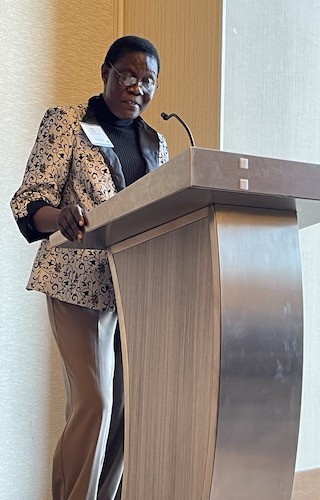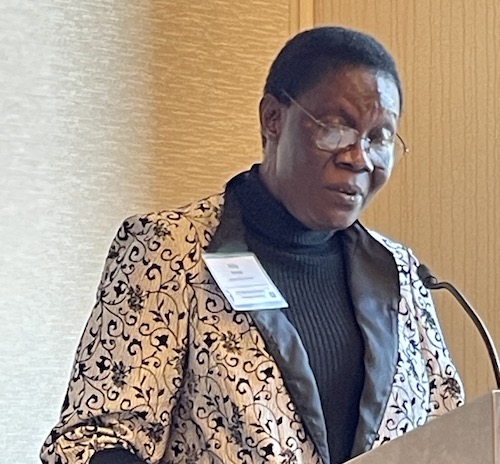When Dr. Milly Erema was in Michigan in October and November 2023, she gave several seminars at area churches about how she reads the Bible from an “insider’s perspective.” She understands ancient rituals and symbolism in the Old Testament that is lost on Western readers because of growing up in an East African culture with traditional practices that resemble the Ancient Near East in many ways. Many puzzling passages make more sense in this context.
She and Lois Tverberg, who writes about the Bible in its cultural context, had a lively conversation about her “ancient” perspective on the Bible.
You can watch one of their talks below!
Paper Given at the Evangelical Theological Society Meeting
Dr. Milly and Lois Tverberg also traveled to San Antonio to attend academic meetings in biblical studies. They attended the conferences of ETS (Evangelical Theological Society), IBR (Institute for Biblical Research) and SBL (Society for Biblical Literature).
At ETS, Dr. Milly gave a paper about how her East African traditional knowledge sheds light on Psalm 82, a puzzling psalm for Christians. Consider the text of Psalm 82:
God has taken his place in the divine council;
in the midst of the gods he holds judgment:
“How long will you judge unjustly
and show partiality to the wicked? Selah
Give justice to the weak and the fatherless;
maintain the right of the afflicted and the destitute.
Rescue the weak and the needy;
deliver them from the hand of the wicked.”
They have neither knowledge nor understanding,
they walk about in darkness;
all the foundations of the earth are shaken.
I said, “You are gods,
sons of the Most High, all of you;
nevertheless, like men you shall die,
and fall like any prince.”
Arise, O God, judge the earth;
for you shall inherit all the nations!
Christians puzzle over how this psalm speaks of God seemingly among other gods. It sounds like some kind of polytheism is being hinted at, which the term “divine council” also suggests. Dr. Milly has an answer for this from her culture, where human leaders are spoken of as “gods” because the assumption was that the spirit of the god was speaking through them. It is as if God gives a bit of his Spirit to each person who has authority to rule or judge on his behalf.
 This is actually not unlike what you see in the OT when kings are anointed and are filled with God’s Spirit, (1 Sam 16:13) or when the 70 elders are filled with the Spirit after Moses delegates some of his duties to them. (Numbers 11:25)
This is actually not unlike what you see in the OT when kings are anointed and are filled with God’s Spirit, (1 Sam 16:13) or when the 70 elders are filled with the Spirit after Moses delegates some of his duties to them. (Numbers 11:25)
Dr. Milly sees Psalm 82 as a rebuke upon human leaders who are corrupt, who neglect the needs of their people. They may think they are gods and can act with impunity, but they will realize their humanity when they face judgment for their misdeeds when they die.
You can read her paper at the link (pdf.):
A Contextual Analysis of Psalm 82 from an African Perspective – FINAL
